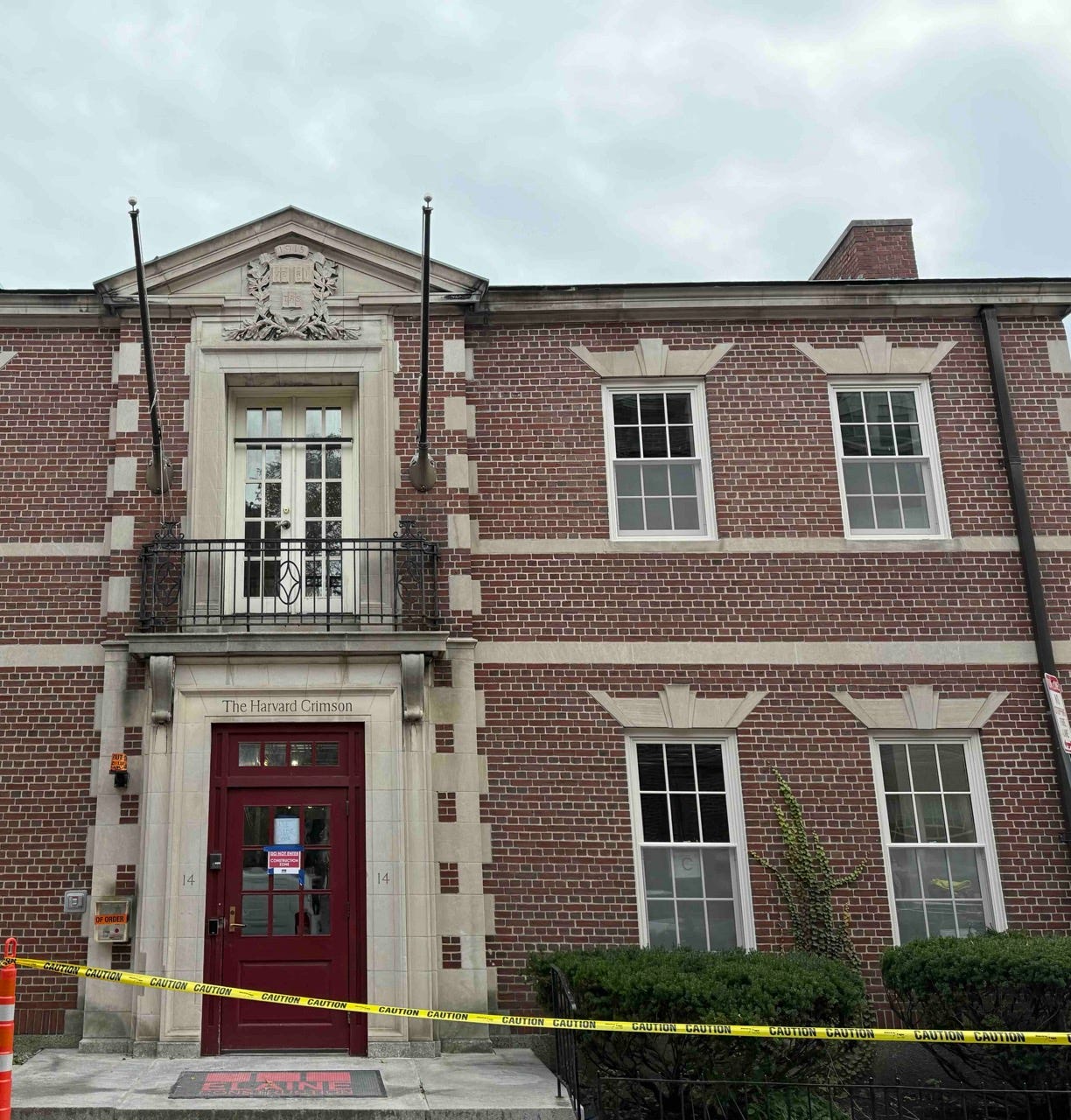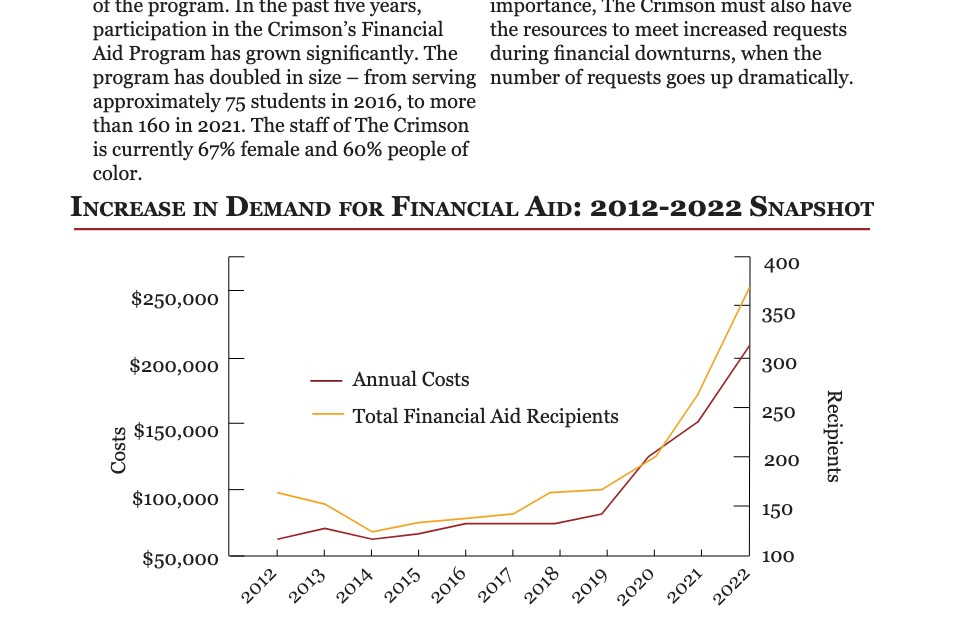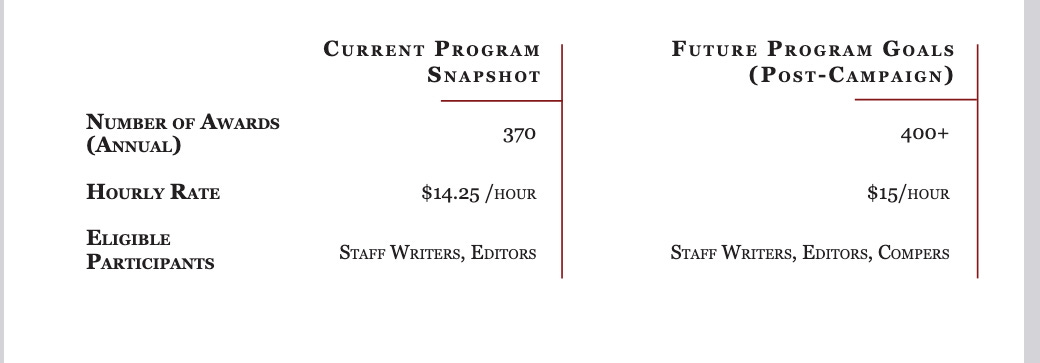Has the Palestine Solidarity Committee Taken Over The Harvard Crimson?
It sure looks that way.


On October 10 The Harvard Crimson published a news article about what it said was “the first event hosted by the Harvard Undergraduate Palestine Solidarity Committee this school year.” The article quoted only two people. One was “Olivia G. Pasquerella ’26, an organizer for the PSC and Harvard Out of Occupied Palestine” who was identified as also “a Crimson Magazine editor.” The second was “PSC organizer Mahmoud M. Al-Thabata ’27,” who was described as “a Crimson Editorial editor.”
I found it strange that of the people quoted in the news article about the event of an extreme anti-Israel organization, two out of two of them, or 100 percent, were Crimson editors. That is in addition to other Crimson editors recently with public Palestine Solidarity Committee or Harvard Out of Occupied Palestine protester affiliations, including Dalal Hassane ‘26, Nuriel R. Vera-DeGraff ’26, Violet T.M. Barron ’26, Guillermo S. Hava ’23-’24, and Prince A. Williams ‘25. But I didn’t wind up writing anything about it, figuring the Crimson is just a student newspaper, so why bother.
On October 20 the Crimson published a news article about an appearance at Harvard by Senator Fetterman, Democrat of Pennsylvania. The news article described him as “The divisive Pennsylvania senator, whose ardent support of Israel sets him apart in the Democratic Party.” I made a parenthetical remark and posted a Facebook comment about this pointing out that it’s divisive of the Crimson to use a supposedly neutral news article to describe it as divisive merely to be supportive of Israel’s war of self-defense against Hamas terrorists and Hezbollah terrorists and the nuclear-arms-seeking terror-sponsoring Iranian regime. But I didn’t make a big deal of that Crimson misstep, either.
On October 24 a Crimson news article reported “Representative Seth W. Moulton ‘01 (D-Mass.) pledged last week to return all donations he has received from the American Israel Public Affairs Committee and refused to accept future campaign funding from the organization.” The Crimson article quotes Moulton bashing AIPAC and the Israeli government and includes a sentence saying “Support for Israel is ‘a pretty clear disadvantage’ in the run-up to the Democratic primary next year, according to Harvard Kennedy School professor Matthew A. Baum.” Yet there’s nothing in the piece to represent the point of view of AIPAC or of pro-Israel voters. A spokesman for AIPAC, Marshall Wittman, told The Editors the Crimson didn’t contact AIPAC for the story. The Crimson wouldn’t even have had to email or pick up the phone—AIPAC responded to Moulton on social media, saying that Moulton “is abandoning his friends to grab a headline, capitulating to the extremes rather than standing on conviction. His statement comes after years of him repeatedly asking for our endorsement and is a clear message to AIPAC members in Massachusetts, and millions of pro-Israel Democrats nationwide, that he rejects their support and will not stand with them.”
The Crimson article says about AIPAC, “A lobbyist for the Israel government established the bipartisan organization in 1954.” That characterization leaves readers with a false impression about AIPAC. The phrase “a lobbyist for the Israeli government” appears also to be lifted without credit by the Crimson directly from Wikipedia, whose entries on Israel-related topics have recently been the subject of an organized takeover push by anti-Israel activists. AIPAC’s founder, I.L. Kenen, has written, “There are myths about our lobby. It was not organized by the Israeli government. It was formed by, and representative of, American Jews, with the support of Christian leaders…we were not agents of a foreign government, we were agents of our conscience.” That remains true to this day: AIPAC is an organization of Americans who support a strong U.S.-Israel relationship.
Another example of anti-Israel, anti-Jewish bias at the Crimson also came October 24, in its slanted story about the Thursday noon event on the Harvard campus. I was present at the event and wrote my own account of it, so I know firsthand how deficient the Crimson’s account is. From the headline to the omissions to the characterization of what is happening in Gaza, it misleads readers.
Crimson headline: “Removal of Harvard PSC’s ‘Wall of Resistance’ Sparks Confrontation Between Larry Summers, College Officials.” It wasn’t the removal of the wall that sparked the confrontation, what sparked the confrontation was the decision of two Harvard deans to interrupt a pro-Israel speaker and a Jewish event with a request that they move out of the way to make room for the Palestine Solidarity Committee. Had the deans simply waited a few minutes for Summers to finish speaking and the event to conclude, there would have been no confrontation. And had the Palestine Solidarity Committee not chosen to erect a large lie-filled anti-Israel structure at a central campus crossroads, there also would have been no confrontation.
First sentence: “The removal of a weeklong exhibit by the Harvard Undergraduate Palestine Solidarity Committee in the Science Center plaza led to a confrontation between former University President Lawrence H. Summers and College administrators on Thursday afternoon.” It wasn’t an “exhibit,” it was a large lie-filled anti-Israel structure. And, again, it wasn’t the removal that led to the confrontation but the erection and presence of the structure and the deans’ decision to interrupt a Jewish organization’s event organized to push back against the lies.
Second sentence: “The ‘Wall of Resistance,’ built of six painted wooden panels designed and installed by PSC members, was the latest iteration of the organization’s annual exhibit condemning Israel’s treatment of Palestinians.” This is not an “annual” exhibit; it began in 2017, described at the time by the Crimson as “aimed at drawing attention to social justice issues and protesting the Trump administration.” In 2019, the Crimson described it as “a public art project that highlights various social justice causes” including “racial discrimination, mass incarceration, immigration and undocumented issues, sex inequality, police brutality, and the occupation of Palestine.” It only was in 2022 that the wall showed up in Harvard Yard—during Passover—and became entirely, obsessively, devoted to demonizing Israel. The Crimson’s article that year included a quote from the student president of Hillel calling the display “deeply, deeply offensive” and “disgusting.” It’s also not accurate to describe the exhibit as merely “condemning Israel’s treatment of Palestinians.” The exhibit advocates the elimination of the Jewish state (via the “right of return”) and demonizes Israel with false accusations. For a full analysis and panel-by-panel explanation of how problematic is this year’s large lie-filled anti-Israel structure, please see “‘Zionism Is a Disease’ Poet Is Hailed in New Harvard Campus Structure Full of Lies,” The Editors, October 22, 2025.
The Crimson article concludes with this passage:
Asked for comment on Summers’ speech, PSC organizer Olivia G. Pasquerella ’26 said that “it is not antisemitic or racist to critique a state that is perpetrating a genocide that has killed tens of thousands, if not hundreds of thousands, of Palestinians.”
“That’s what the wall talks about,” Pasquerella added.
That Crimson article, unlike a previous one, does not identify Pasquerella as a Crimson editor. (Some Crimson editors have also been involved with Harvard Hillel or Harvard Chabad, but those are Jewish religious, educational, and cultural organizations, not primarily advocacy organizations devoted to boycotting a country or its students and scholars. And the Crimson itself has been the target of a parody “Crimeson” from anti-Israel activists who think the paper hasn’t gone far enough, though that tells more about the extremism of the anti-Israel activists than it does about what is happening at the Crimson.)
The Crimson news article itself basically endorses the false genocide claim, writing, “More than 60,000 Palestinians have been killed in the war, including more than 18,000 children, according to Gaza’s Health Ministry, which is run by the Hamas administration controlling Gaza. An International Court of Justice inquiry into whether Israel has committed genocide in Gaza is expected to take years to issue a finding, though a United Nations inquiry concluded last month that Israel’s actions in the territory amounted to genocide.” The Crimson doesn’t say that the “children” include many teenagers who are recruited as Hamas fighters, or that Hamas uses the civilians as human shields, or that the “United Nations inquiry” was a sham. Israel’s foreign ministry replied, “Three individuals serving as Hamas proxies, notorious for their openly antisemitic positions — and whose horrific statements about Jews have been condemned worldwide — released today another fake ‘report’ about Gaza. The report relies entirely on Hamas falsehoods, laundered and repeated by others.” The Begin-Sadat Center for Strategic Studies has issued a 311-page report debunking the false genocide allegation against Israel; the Crimson doesn’t mention that.
The Crimson article omitted some key aspects of the event. It left out the statements by Rabbi Hirchy Zarchi, the founder and president of Harvard Chabad and the Jackie and Omri Dahan Harvard Chabad Jewish Chaplain, who began the event by saying that he had heard, in particular from members of the Harvard Class of 2029 who live in the Yard, “that they increasingly feel that there’s a neutrality when it comes to Jew-hate.” Zarchi directly rebutted some of the false claims on the large lie-filled anti-Israel structure about Israel targeting hospitals and the press. He noted that Hamas had used hospitals as terror bases and had disguised its terrorists with press vests.
It omitted some key points that Summers made in his remarks, that Summers said, addressing the anti-Israel students directly, “And my speech holds that you bring shame, dishonor and prejudice to our campus, that people of morality will condemn and disapprove what you have done.”
The Crimson omitted that Summers encouraged those present to write to Harvard President Alan Garber and Dean of the College David Deming expressing regret “that the tone of so much of the discourse at Harvard validates antisemitism and expressing the strong hope that they will use their leadership positions to assure that there is balance and neutrality.”
The Crimson omitted that Summers also suggested that in dialogue with the Palestinian advocates in our midst, “Ask this question: Have you ever criticized Hamas?...Or has your condemnation been confined to Israel? And, if only Israel, you are antisemites.”
The Crimson published an October 28 letter to the editor from Summers: “I write with concerns that the very high journalistic standards at The Crimson have declined where its staff’s tendentious views on Israel are involved….I am concerned about the integrity of the reporting process.”
But the Crimson did not include that Summers letter-to-the-editor in its email newsletter, rendering it basically invisible to the many readers for whom the email newsletter is the primary way they discover what is in the Crimson. I’ve had that treatment take place with my own pro-Israel letters to the editor of the Crimson, which is one reason that I ceased bothering to send them.
I didn’t write about those two episodes either, though I did send an email inquiry to the president of the Crimson, with a copy to an alumni volunteer. The subject line was “Media Query re anti-Israel bias in Crimson news and editorial coverage.”
I asked:
*Does the Crimson have any Israeli or Orthodox Jewish news reporters?
*Has the Crimson internal demographic survey data on religion and politics of the editors been updated since I last wrote about them in December 2023? https://www.futureofcapitalism.com/2023/12/harvard-crimson-demographics
Or have you stopped collecting or publicly releasing the data? If the data are available can you please share them with me?
What is your response if any to concerns about anti-Israel bias in the Crimson coverage?
What is the level of overlap between Crimson editors and the Palestine Solidarity Committee and should readers be concerned about that?
I got no reply.
This morning I checked the Crimson website and there was a headline: “Ethicist, Should I Let Go of My Zionist Friends?”
It is by one Andrés Muedano, an international student from Mexico who wrote for the Crimson on February 3, 2025: “I also stand in solidarity with the people of Palestine. Witnessing ‘the first live-streamed genocide in history,’ to quote Palestinian novelist Susan Abulhawa, I have grown frustrated at Harvard’s continued investments in companies tied to weapons manufacturing and Israeli settlements….Just like ‘the charge of antisemitism is being used to dispossess the Palestinian people of their last resource of land,’ as Israeli poet Yitzhak Laor wrote in a letter to the London Review of Books in 2003, so too are accusations of antisemitism today being weaponized against foreigners in America.”
It’s not a genocide, and it’s not “the first live-streamed genocide in history.” The charge of “genocide” against Israel in Gaza is so patently absurd that I haven’t even deemed it to merit a thorough debunking, but for those who are curious, Bret Stephens of the New York Times had a July 2025 New York Times column on the topic and John Spencer, a West Point urban warfare expert who has been to Gaza four times since October 7, also dealt with the false accusation.
Anyway, the false genocide accusation apparently won Muedano a promotion to the lofty position of Crimson “ethicist,” “a site of moral inquiry open to all Harvard Community members.” Today’s column says:
You are friends with people who support Zionism and wonder whether you should choose not to be friends with them. Since Zionism encompasses a wide range of beliefs, it is difficult to identify a universally applicable reason for you to end these friendships. Indeed, for each one of your friends who calls themselves a Zionist, the word “Zionism” might entail different political commitments. For some, it might involve continued support for a two-state solution that enables the self-determination of both Jews and Palestinians. For others, it might imply a more stringent support for Israel alongside the belief that — despite overwhelming expert evidence — Israel’s military conduct in Gaza is justified and not genocidal.
In any case, you might find some visions of Zionism more morally objectionable than others. And perhaps because of these objections, you might feel wary of staying friends with Zionists.
If what you are asking is whether you are justified in letting go of your Zionist friends, then the matter is simple. The answer is yes.
The column goes on to say that while it is justifiable to drop Zionist friends, it is not obligatory. How generous.
One reason I held off so long before weighing in on the Crimson is that they are mere undergraduates, by definition at an early and incomplete stage of their educations. I was a Crimson editor a long time ago and one of the special things about the place is the freedom it affords to make mistakes without a lot of guidance or interference from grownups. Recall also that the Crimson in 2022 editorially endorsed the effort to Boycott, Divest, and Sanction Israel.
A good question here though is, where are the grownups?
Writing for the Crimson used to be a volunteer extracurricular activity, but it has become a campus job at Harvard, listed as such on the official Harvard Student Employment Office website, which helpfully advises, on a page listing jobs at the Crimson, “For students who are eligible for the Federal Work Study Program: You can use your FWS award for both on and off-campus employment! The program subsidizes your wages, making you an attractive candidate especially to on-campus departments and off-campus non-profits.”

Hundreds of thousands of dollars a year, supervised by grownups, is going into paying students, via Harvard, $15 an hour to write the anti-Israel articles. As in so many other dark corners of Harvard, instead of being vigilant to ensure quality and to prevent discrimination, the grownups have taken a hands-off approach. Instead of wisdom and teaching, they have instead provided excess leniency and generosity that winds up ultimately doing a disservice to the students and to Veritas.
Thank you: The Editors is a reader-supported publication that relies on paying customers. Unlike the Crimson or Harvard, it has no endowment. If you know someone who would enjoy or benefit from reading The Editors, please help us grow, and help your friends, family members, and associates understand the world around them, by forwarding this email along with a suggestion that they subscribe today. Or send a gift subscription. If it doesn’t work on mobile, try desktop. Or vice versa. Or ask a tech-savvy youngster to help. Thank you to those of who who have done this recently and thanks in advance to the rest of you.




"But the Crimson did not include that Summers letter-to-the-editor in its email newsletter, rendering it basically invisible to the many readers for whom the email newsletter is the primary way they discover what is in the Crimson." Indeed. As one for whom the email newsletter is the primary way I discover what is in the Crimson, the Summers letter was invisible to me—until you shared it here.
One of the most (perhaps the most) valuable lessons I belatedly took away from my years in college was not to let politics disrupt friendships. Perhaps those who follow the Crimson "Ethicist's" advice to break off relations with "Zionists" will one day similarly come to rue doing so.